Perception is how humans take in their encounters and experiences from their interaction with the environment and synthesise these experiences to deduce their meanings and forms. In perceptions, the senses perform a very fundamental and significant role in linking the internal environment to the external experiences. The senses pick up these experiences and directly transmit them to the brain which in turn interprets these experiences to establish meaningful output.
Perception
The thinking process is incomplete without the senses. the five senses in human beings are:
- sight;
- taste;
- smell;
- hearing;
- touch.
These senses record the human experiences and transmits them to the brain for interpretation.
No thinking process can effectively be complete without the five senses being used (Brynie, 2001). Perception wholesomely rely on the five senses, i.e., touch, sight, hearing, smell and taste.
The five senses act as an input that directs the outward experiences into the brain which interprets these experiences and an output is relayed back to the senses. Our perception thus defines how we think.
How we perceive is defined as a result of what we have learnt from the environment around us. Humans know how to distinguish perceptions based on what they have learnt about such phenomena.
Through the senses, we are able to deduce qualities of substances as the brain synthesizes them. One is capable to respond to various stimuli that are detected by these sense organs through a complex brain stimuli-response mechanism.
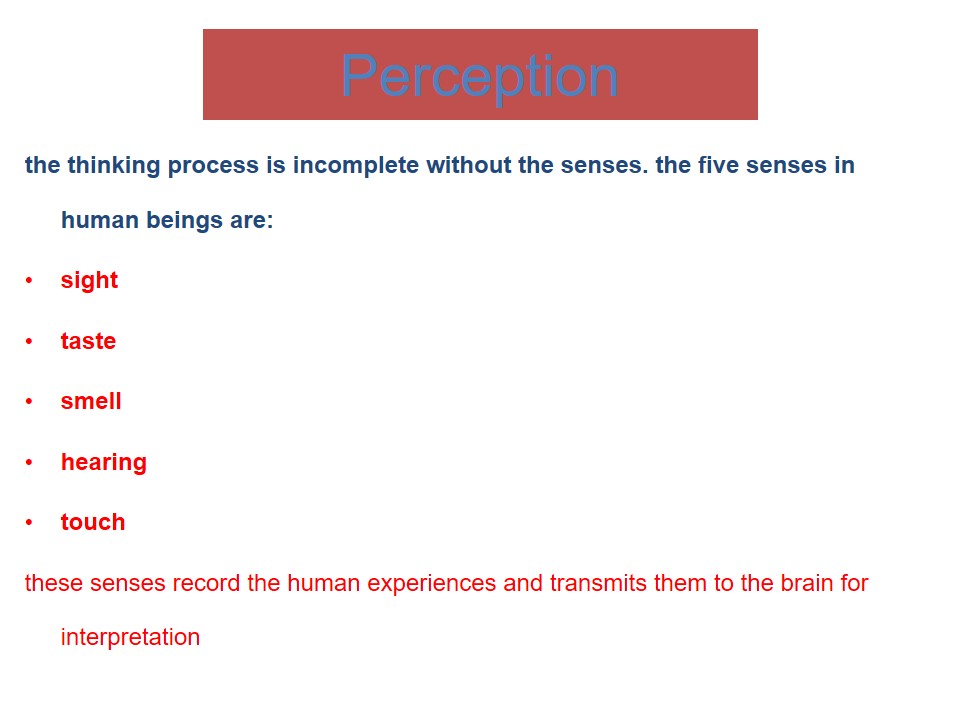
Taste
- Uses the taste buds to identify how various chemicals in the food materials taste like.
- Taste buds are located in the tongue at the tip of the tongue
- There exists several tastes that can be identified by the tongue, they include:-
- Sweet;
- Bitter;
- Sour;
- Salty;
- Umami.
In order to distinguish the chemical composition of any substance, the sense of taste is applied. The tongue has the capability of contrasting the tastes of the chemicals in substances by using taste buds present in the tip of the tongue. The tongue is able to identify the following tastes.
- Sweet.
- Bitter.
- Sour.
- Salty.
- Umami.
Taste buds are located at various positions in the tongue. The tongue is symmetrically divided into different regions that detect the various tastes listed above.
Through the sense of taste, we are capable to categorize various substance according to their tastes. The role of the brain is to interpret the kind of taste that has been detected by the tongue, as discussed earlier, our perception is a completely learnt process and wholesomely depend on the environment that one inhabits. The brain, as well, interprets the various stimuli detected by the senses according to the information already learnt and stored in the brain.
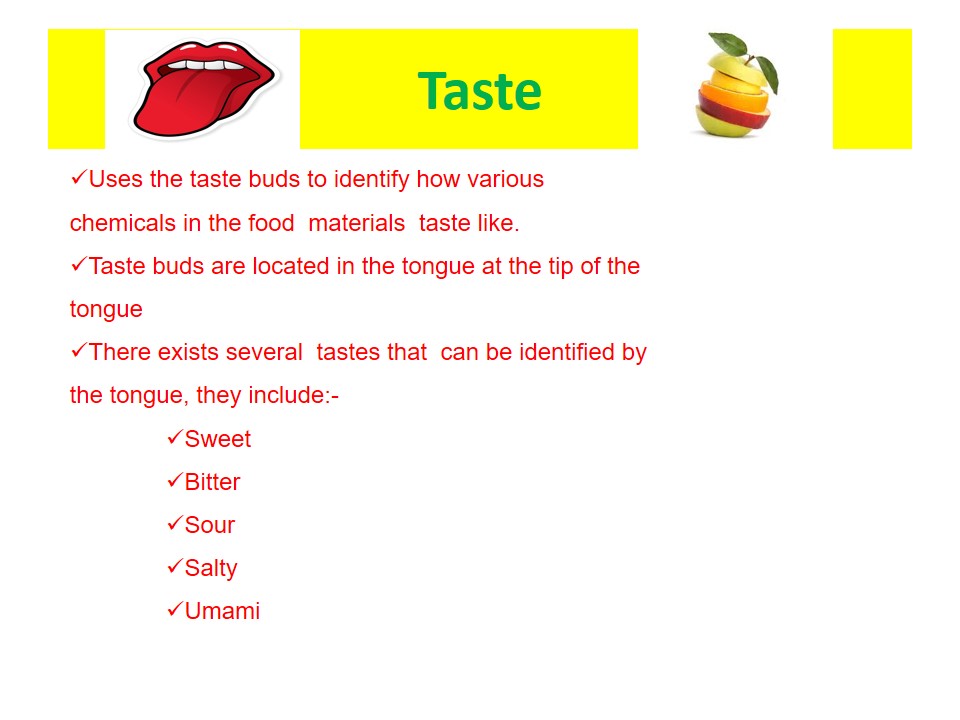
Smell
- The olfactory cells present in the nose are able to detect the aroma or the odour of any substance.
- Through smell, one can distinguish properties of different substances.
- The olfactory cells conduct the smell to the brain which interprets it accordingly.
Our nasal cavity is lined with numerous olfactory cells responsible to absorb the smell of any substance from the environment, send the stimulus to the brain which shall in turn provide a response accordingly. Through this perception of smell, we are capable of making contrasts between substances.(Herz, 2007) Researchers have concluded that in the brain, there exists a chemical map or a reference “chemical template” where the reference is made. When the olfactory cells detect the smell, the brain uses the chemical map already stored in the brain to interpret the smell and respond effectively to the smell.
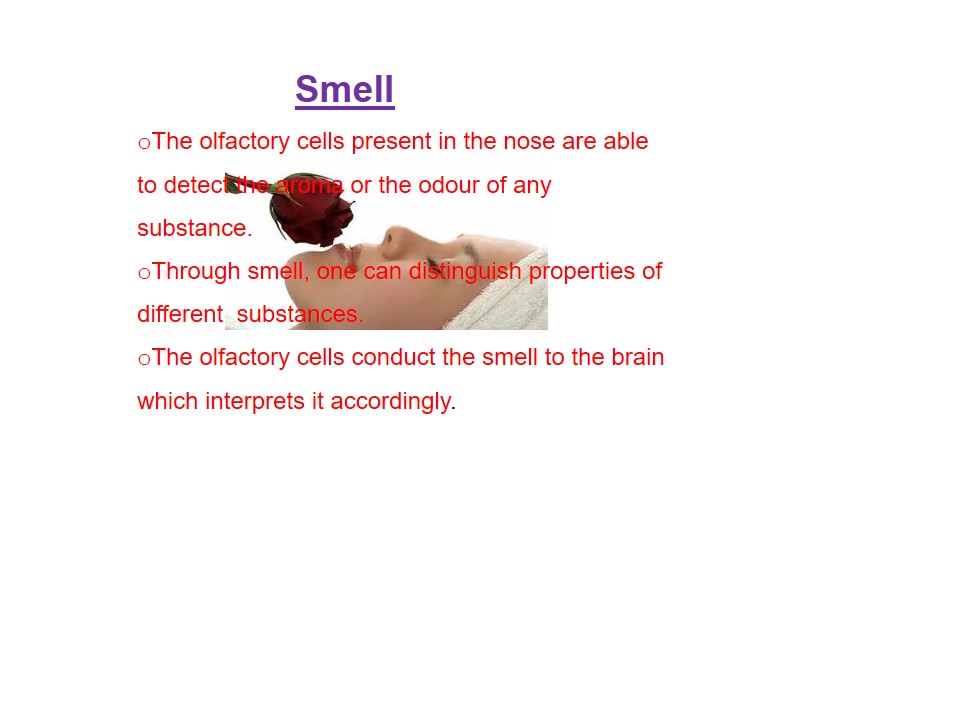
Touch
- qThe sense of touch enables us to identify the qualities of objects by just the “feeling.”
- qThe tactile sense can detect the temperature or the texture of the stimuli as interpreted in the brain.
Through the sensory neurones in the skin, the body is capable of identifying the texture and temperature of substance through the sense of touch.(Cobb and Lewis, 2001) Tactlie means are very important in determining the temperatures of various objects by simply “feeling it.” The brain is capable of responding to the stimulus sensed through the tactile sense depending on the stimulus it is fed. Mostly,we use our fingers to interpret the temperature or texture of any object even though the whole skin has sensory organs capable of tactile perception.
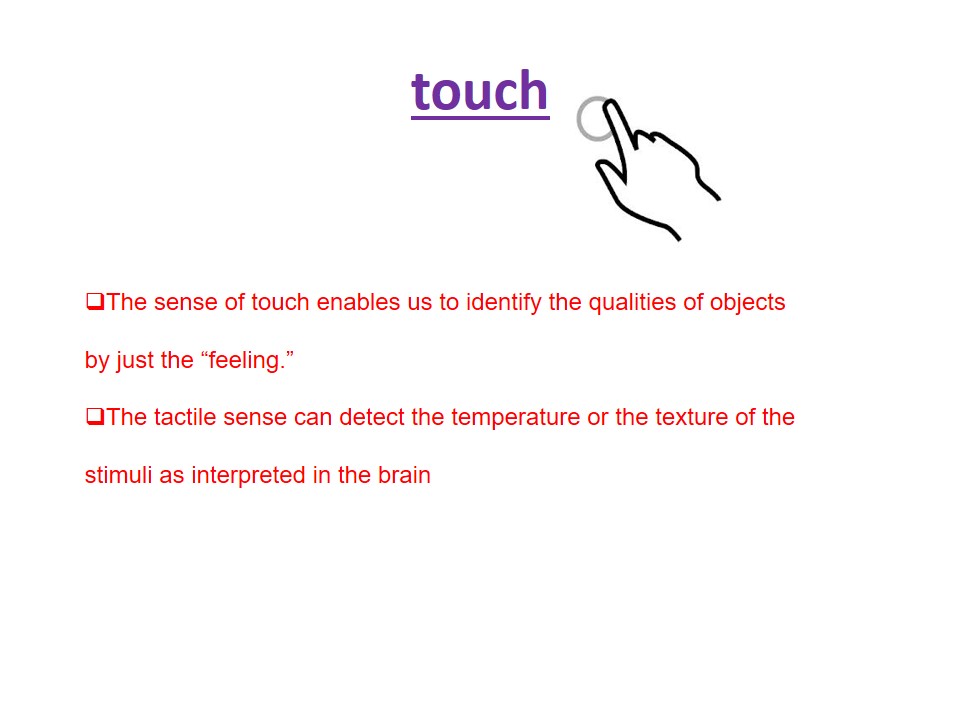
Sight and hearing
- Sight sense is as a result of light perceived by the eyes.
- The light visible to the naked eye is processed in the brain and interpreted.
- The ears pick up vibrations from the environment . These vibrations are conducted to the brain for interpretation.
- The ears pick up the sound waves, filter out the unwanted and synthesise the important waves for the interpretation by the brain.
Arguably, the sense of sight forms the most primary and useful sensory organ. The eye perceives light from the environment and transmits it into the brain for interpretation. The brain, as earlier mentioned, will rely on learnt experiences to interpret the light picked up by the eyes and provide a response. This involves a complex brain mechanism aided by the optical nerves that connect the eye cavity to the brain.
On the other hand, the ears pick sound waves from the surrounding environment and through the auditory nerves, conducts the vibrations or sound waves to the brain for interpretation. The brain categorizes these waves into meaningfull forms thereafter.
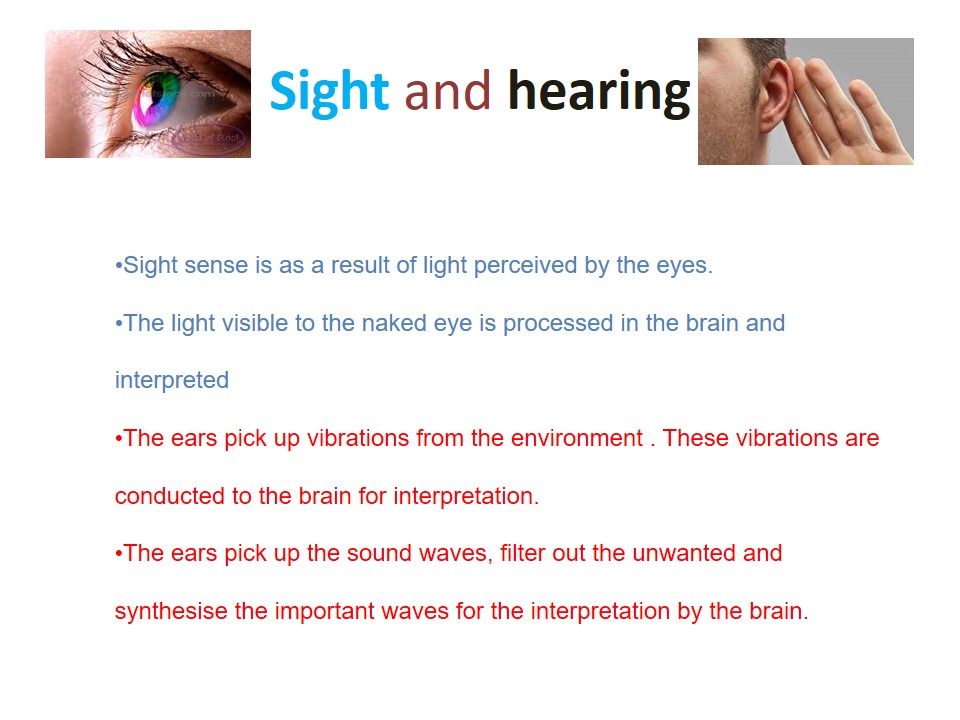
Role of perception in critical thinking
- How we look at things determine how we process and react to information.
- The interpretation of various stimuli detected by the sense organs is as a result of learning. How we perceive and interpret stimuli depends on information learnt by brain.
- Our judgements of phenomena is entirely based on our perception.
- Interpretation of stimuli is dependent on our earlier learning experiences.
The manner in which we interpret various phenomena is completely a result of how we perceive these phenomena.(Olson, 2000) Senses are very fundamental in the thinking process. The thinking mechanism heavily rely in the information fed into the brain, this information, on the other hand, is conducted into the brain through the sensory organs.
How we interpret and respond to the stimuli in the environment is dependent on perception. The behavioural responses that we experience respond to the perceptions as detected by our senses.
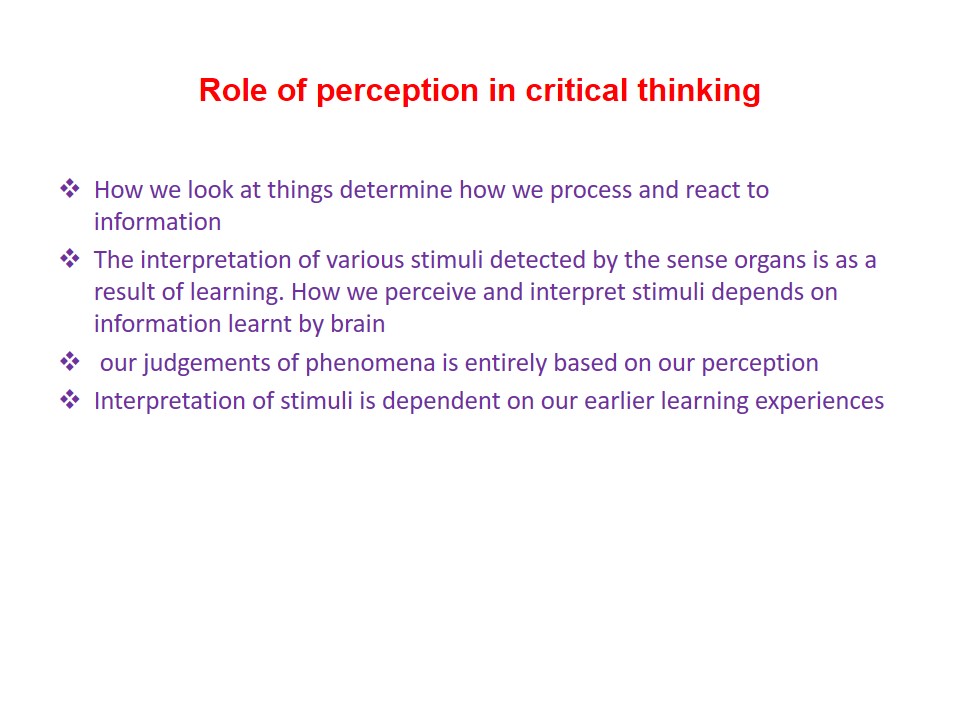
References
Brynie, F. H. (2001). Perception. Woodbridge: Blackbirch Press.
Cobb, V., & Lewis C.C. (2001). Feeling your way: discover your sense of touch. Brookfield: Millbrook Press.
Herz, R. (2007). The scent of desire: discovering our enigmatic sense of smell. New York: William Morrow.
Olson, I. (2000). The arts and critical thinking in American education. Westport: Bergin & Garvey.